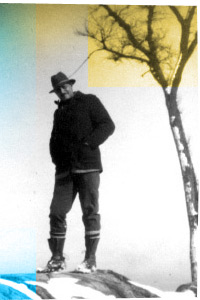 |

- - - - - - - - - - - - - - - - - - - -
 American nature writers, ever since Walden, have invited comparison with Henry David Thoreau, whose determined communion with the natural world, and trenchant critique of human society, mark the beginning of first-person nature narrative as it is practiced today. American nature writers, ever since Walden, have invited comparison with Henry David Thoreau, whose determined communion with the natural world, and trenchant critique of human society, mark the beginning of first-person nature narrative as it is practiced today.
"Americans have always loved romances of isolation," as Robert Finch remarked in his introduction to The Outermost House, adding that the "solitary-sojourn" form of nature writing that began with Walden came down to us through the writings of Henry Beston, and continues today in the titles of our modern classics: Pilgrim at Tinker Creek; Desert Solitaire; Jennifer Ackerman’s Notes from the Shore; and Rick Bass’s Winter, to name only a few. In these books, a solitary writer inhabits a particular landscape, seeking to learn it, and himself or herself, through the course of the natural year.
If you build or inhabit a small house in an out-of-the-way place, live there without apparent employment, spend your time looking at the world around you, and then attempt to write probingly and poetically about your situation and that of the world, your literary ancestry will date to Walden; and whether or not you arrive at similar conclusions, you will be judged a child of Thoreau.
With Henry Beston, the comparisons were obvious, and immediate. Like Thoreau, he was a native of Massachusetts and a Harvard graduate. He bore the same Christian name, had gone to a place Thoreau had written about, and produced a book of singular solitude, beauty, and philosophy. Like Thoreau, Beston possessed a rare poetic ability with what Finch called the "singular utterance," the quotable thought. Like Thoreau, he saw an accelerating technological society as a force that would separate humankind from its natural roots; like Thoreau, who wished "to spend a day as deliberately as Nature," Beston wanted to participate in the natural life of The Great Beach on its own terms, and at its own pace. Like Thoreau, Beston saw human life as properly arising from nature; and like Thoreau, he counseled us to suture the widening rift between the two. Was Beston, then, a latter-day Thoreau?
In his own opinion, No.
Beston realized that comparisons were inevitable, but he said that while he admired Thoreau, he didn’t "much care for him," adding that Thoreau "wasn’t warm enough."
In a letter to author Winfield Townley Scott, Beston addressed the matter this way:
"I suppose that I do link up with Thoreau, but I do not read him and have not been under his influence. He is not a naturalist. What interests him and stirs him most deeply are the principles governing the individual life when that life is enclosed in a gregarious society. If I tie in with anybody, it is with Richard Jefferies. We are both of us scholars with a poetic joy in the visible world." (More on Richard Jefferies can be found in our "Henry’s Progenitors" link on this website.)
Today, on the strength of his voluminous journals and two recently published books dealing with his observations of the plant world, most students of nature-writing and natural history view Thoreau as a naturalist superior to Beston; and whether Beston wished to acknowledge it, his own writing suggests not only a strong familiarity with Thoreau but a strong kinship as well. Consider, for one example, the following passage from Walden:
"The morning wind forever blows, the poem of creation is uninterrupted; but few are the ears that hear it";
and this often-quoted passage from The Outermost House -- in the form, incidentally, in which it is inscribed on Henry Beston’s gravestone:
"Creation is still going on, the creative forces are as great and active today as they have ever been, and tomorrow’s morning will be as heroic as any of the world."
Coincidence, or kinship?
- - - - - - - - - - - - - - - - - - - -
|
 |



